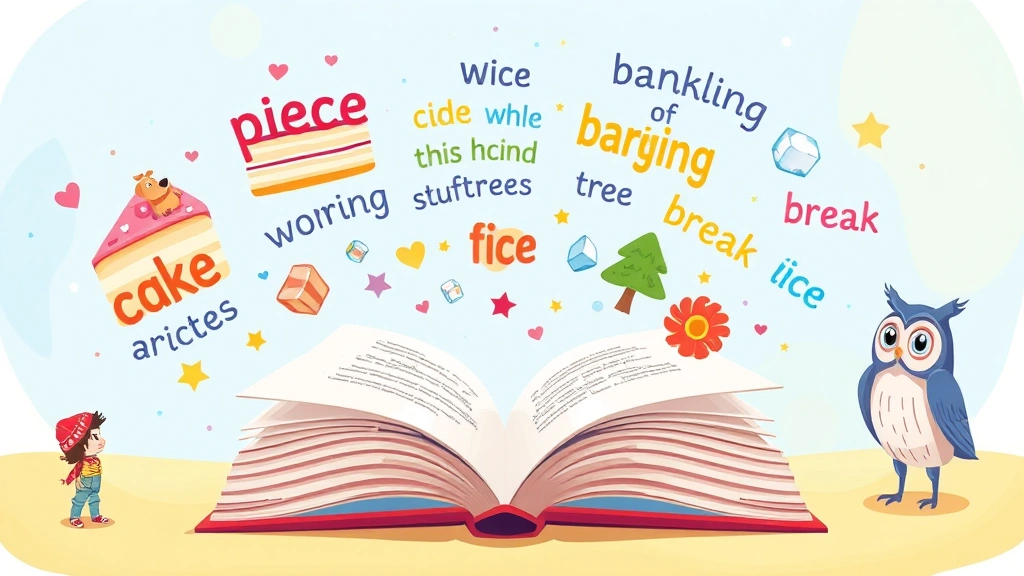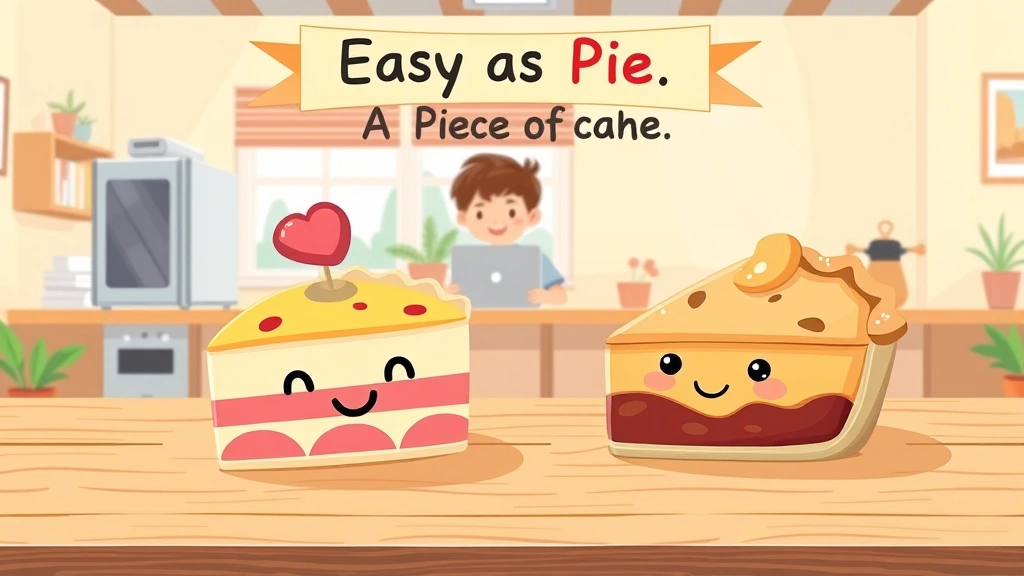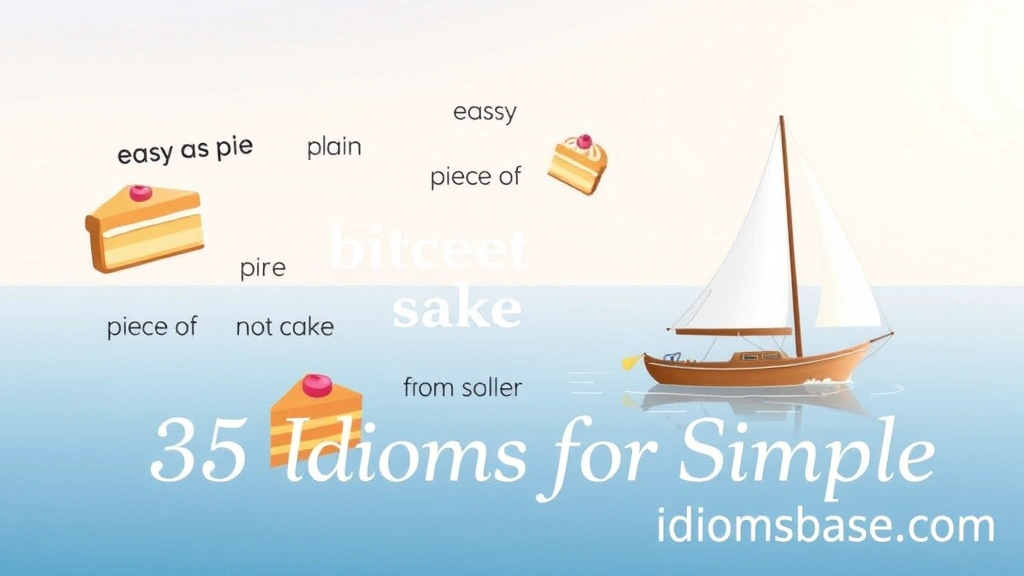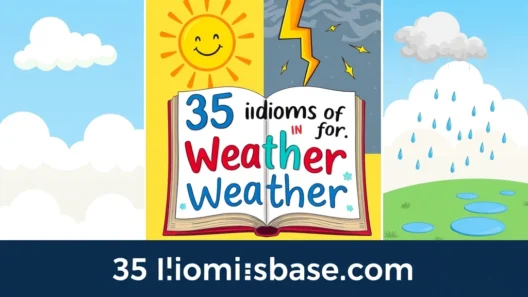Have you ever found yourself searching for just the right words to describe something incredibly easy? English is a treasure trove of expressions, and when it comes to "simple," we have a delightful array of idioms that add flavor, wit, and precision to our language. Forget just saying "easy"; let's dive into a world where tasks are a "piece of cake" and decisions are "no-brainers"!
Idioms are fascinating, aren't they? They often don't make literal sense, but their figurative meaning is universally understood by native speakers. For language learners, mastering idioms is a huge step towards sounding more natural and fluent. So, whether you're a student, a professional, or just someone who loves language, get ready to expand your vocabulary with these 35 brilliant idioms for "simple."
Unlocking the World of "Simple" Idioms
Let's explore these fantastic expressions, grouped for your convenience. You'll find that many of them paint vivid pictures in your mind, making them easier to remember and use!
Idioms Describing Tasks or Processes as Easy
These idioms are perfect for when you want to emphasize how straightforward a job or activity is.
- A Piece of Cake: This is probably one of the most common and beloved idioms for something very easy.
- Example: "The exam was a piece of cake; I finished in half the time!"
- Easy as Pie: Similar to "a piece of cake," this idiom suggests something requires minimal effort.
- Example: "Setting up the new software was as easy as pie."
- Walk in the Park: When an activity is so simple it feels like a leisurely stroll.
- Example: "For an experienced programmer, debugging this code will be a walk in the park."
- Child's Play: Implies something is so simple, even a child could do it.
- Example: "Figuring out this puzzle was child's play for her."
- No-Brainer: A decision or solution that is so obvious, it requires no thought.
- Example: "Choosing the faster route was a no-brainer."
- Plain Sailing: Describes a situation or process that is free of difficulties or complications.
- Example: "Once we got the initial setup done, it was plain sailing from there."
- Smooth Sailing: Very similar to "plain sailing," indicating an easy and trouble-free progression.
- Example: "The project went smoothly, nothing but smooth sailing from start to finish."
- Like Taking Candy from a Baby: Suggests something is effortlessly easy, perhaps even unfairly so.
- Example: "Winning against that inexperienced team was like taking candy from a baby."
- A Cinch: An informal way to say something is extremely easy.
- Example: "Learning to ride a bike was a cinch for him."
- A Breeze: When something feels light and effortless, like a gentle wind.
- Example: "Organizing the event was a breeze with all the help we had."
- Easy Peasy Lemon Squeezy: A playful and informal way to say something is very easy. Often used with children or in lighthearted contexts.
- Example: "Tying my shoelaces is easy peasy lemon squeezy now!"
- Nothing to it: Indicates that a task or situation is not difficult at all.
- Example: "Don't worry about fixing the leaky faucet; there's nothing to it."
- Simple as That: Used to emphasize the straightforwardness of a solution or explanation.
- Example: "You just press this button, and the machine starts. Simple as that!"
- Straightforward: While not strictly an idiom, it's a common adjective used to describe something simple and uncomplicated.
- Example: "The instructions were very straightforward."
- Like Falling Off a Log: Describes something that is very easy to do, requiring no skill or effort.
- Example: "For him, public speaking is like falling off a log."
Idioms Emphasizing Clarity and Understanding
These idioms are perfect for when you want to convey that something is easy to understand or grasp.

- Crystal Clear: When something is perfectly clear and easy to understand.
- Example: "Her explanation made the complex topic crystal clear."
- Clear as Day: Similar to "crystal clear," emphasizing obviousness and complete understanding.
- Example: "After his detailed presentation, the plan was clear as day."
- Dumbed Down: To simplify something so much that it becomes very easy to understand, possibly to the point of losing nuance.
- Example: "The report was dumbed down for a general audience."
- In Layman's Terms: To explain something using simple language that anyone can understand, avoiding technical jargon.
- Example: "Could you explain that in layman's terms, please?"
- To Spell It Out: To explain something very clearly and explicitly, often when someone is having difficulty understanding.
- Example: "I had to spell it out for him, step by step."
- No Rocket Science: Implies that something is not difficult or complicated, contrary to what one might think.
- Example: "Following the recipe is no rocket science."
- It's Not Brain Surgery: Another way to say something isn't difficult or complex, often used humorously.
- Example: "Just fill out the form; it's not brain surgery!"
Idioms for Effortless Accomplishment
These idioms highlight the ease with which something can be achieved.
- To Do Something with Your Eyes Closed: To perform a task so easily that you could do it without even looking.
- Example: "He's been driving for decades; he could parallel park with his eyes closed."
- To Do Something in Your Sleep: Similar to the above, meaning you can do it without conscious effort.
- Example: "She knows that routine so well, she could do it in her sleep."
- To Breeze Through Something: To complete a task or pass a test with great ease.
- Example: "He breezed through the interview questions."
- To Sail Through Something: To pass a test or complete a task very easily and successfully.
- Example: "She sailed through her final exams."
- To Go Off Without a Hitch: To proceed smoothly, without any problems or obstacles.
- Example: "The entire event went off without a hitch."
- Effortless: An adjective meaning requiring no effort; easy.
- Example: "Her performance looked effortless, though I'm sure it wasn't."
- To Be a Snap: An informal way to say something is very easy or quick.
- Example: "Installing the new app was a snap."
- To Be a Piece of Cake: (Reiteration for emphasis, as it fits here too!)
- Example: "The whole project was a piece of cake once we got organized."
Unique and Less Common "Simple" Idioms
Let's explore a few more unique ways to express simplicity.
- To Cut Corners: While this often means doing something poorly to save time/money, it can also imply simplifying a process to make it easier, though potentially compromising quality.
- Example: "They cut corners on the design to get the product out faster."
- To Follow the Yellow Brick Road: From The Wizard of Oz, this means to follow a clear, well-marked path or set of instructions.
- Example: "Just follow the yellow brick road in the manual, and you'll assemble it easily."
- To Keep it Simple, Stupid (KISS): A design principle that states most systems work best if they are kept simple rather than made complicated. Often used as an admonition.
- Example: "When designing the new interface, remember to KISS."
- To Make Short Work Of: To deal with something quickly and easily.
- Example: "The team made short work of the remaining tasks."
- To Get the Hang of It: To learn how to do something, especially something difficult, after some practice. This implies that it becomes simple.
- Example: "It was hard at first, but I'm finally getting the hang of driving a manual car."
Frequently Asked Questions About Idioms

You've got questions, we've got answers! Let's clear up some common queries about idioms.
What is an idiom?
An idiom is a phrase or expression whose meaning cannot be understood from the ordinary meaning of its individual words. For example, "kick the bucket" means to die, not literally to kick a bucket.
Why are idioms important in English?
Idioms add richness, color, and nuance to the English language. They make communication more natural, expressive, and often more concise. Understanding and using idioms can significantly improve your fluency and comprehension, helping you sound more like a native speaker.
Are these idioms used in both formal and informal settings?
Some idioms, like "a piece of cake" or "no-brainer," are widely used in both informal conversations and semi-formal contexts. Others, like "easy peasy lemon squeezy," are strictly informal and best suited for casual chats. It's always good to consider your audience and the context when using idioms.
How can I learn and remember so many idioms?
Practice makes perfect! Here are a few tips:
- Context is King: Learn idioms in context, not just as isolated phrases. Pay attention to how native speakers use them.
- Active Use: Try to incorporate new idioms into your own conversations and writing. Start with one or two at a time.
- Flashcards/Apps: Use flashcards or language learning apps that focus on idioms.
- Watch and Listen: Pay attention to idioms in movies, TV shows, podcasts, and books.
- Group Them: As we did above, group idioms by theme or meaning to make them easier to remember.
Do all these idioms mean exactly the same thing?
While all the idioms listed here relate to "simple," they often carry slightly different connotations or are used in specific contexts. For instance, "a piece of cake" is about a task being easy, while "crystal clear" is about understanding. Pay attention to these subtle differences to use them effectively.
Can I create my own idioms?
While new expressions do enter the language over time, creating a widely understood idiom is rare and happens organically as a phrase gains popular usage. It's best to stick to established idioms to ensure your message is understood.
Key Takeaways
- English offers a diverse range of idioms to describe something as "simple," adding richness and precision to your language.
- These idioms can refer to tasks being easy ("a piece of cake"), concepts being easy to understand ("crystal clear"), or accomplishments being effortless ("to sail through").
- Mastering idioms significantly enhances your fluency and makes your English sound more natural and expressive.
- Context is crucial when using idioms; choose the right one for the situation and audience.
- Learning idioms is an ongoing process that benefits greatly from active use, listening, and reading.
So, there you have it! 35 fantastic idioms that will help you describe simplicity with flair and accuracy. Don't let learning them be a daunting task; remember, with a little practice, it'll be a "breeze." Which one will you try using first?







